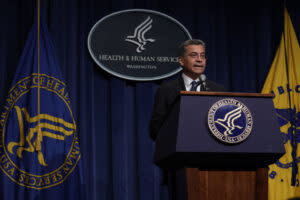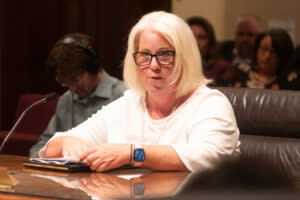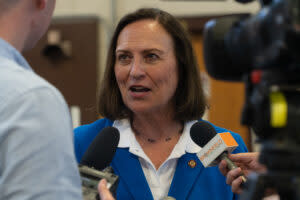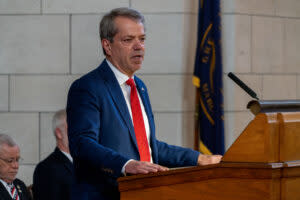Nebraska advocates fear ‘catastrophic’ nursing home staffing rule will lead to closures

- Oops!Something went wrong.Please try again later.
(Getty Images)
LINCOLN — Some Nebraska advocates and lawmakers are fearing more nursing home closures in light of a finalized federal rule for minimum staffing requirements.
In May, the U.S. Centers for Medicare & Medicaid Services published a rule that will set, for the first time, the minimum number of daily nursing hours per resident that facilities must meet (3.48), with a registered nurse on hand at all times. Implementation will be staggered in the next two to five years, differing for rural and urban facilities, and hardship exemptions are available.
Chiquita Brooks-LaSure, the agency administrator, said the changes — part of a handful of new regulations — ensure eligible people can benefit from the “critical lifeline” of health coverage.
“Now, CMS has set its sights on an equally ambitious goal: making sure that coverage connects people to consistently high-quality care, regardless of where they live or receive care,” Brooks-La-Sure said in a statement.
The rule comes partially in response to many nursing home closures and resident deaths during the COVID-19 pandemic. Many congressional lawmakers have tried to stop the rule and vowed to defeat it, saying it would have disparate impacts, particularly in rural communities.
Nebraska lacks sufficient nurses
U.S. Sen. Deb Fischer, R-Neb., was one lawmaker who introduced bipartisan legislation to prevent the rule’s publication and establish an advisory panel on nursing home workforce issues. It was referred to the U.S. Senate’s Committee on Finance.
Gov. Jim Pillen, during a property tax town hall in Grand Island last week, said he has been to Washington, D.C., twice and met with U.S. Department of Health and Human Services leadership regarding the rule. He said he’s asked for special exceptions.
“For crying out loud, we don’t have enough registered nurses to do that,” Pillen said.
Kierstin Reed, CEO of LeadingAge Nebraska, told the Nebraska Examiner that the state has more licensed practical nurses than registered nurses, for example.
“They [LPNs] have less education but more practical experience and they can pretty much do everything that an RN can do except for that clinical diagnosis that says, ‘Yes, this is what this is,’” Reed said.
Reed predicted the rule will lead to one of three outcomes: closures; reduced or eliminated services to lower the number of required staff; or some alternative workaround, such as decertification, which would prevent residents from paying for care with Medicare or Medicaid.
How Nebraska shapes up compliance
KFF, which conducts health policy research, estimates that 19% of facilities nationwide currently meet all staffing minimums in the rule.
Staggered implementation
The federal nursing home staffing requirements will take effect in stages over the next five years, beginning with enhanced facility-wide staffing assessment requirements.
For both urban and rural facilities: Aug. 8, 2024.
Next, a registered nurse must be on hand at all times, and residents must have at least 3.48 daily hours of dedicated nursing care.
Urban facilities: May 2026.
Rural facilities: May 2027.
Finally, the 3.48 care hours per resident must include at least 0.55 hours with a registered nurse and 2.45 hours with nurse aides. The final 0.48 hours can be with any nursing staff type, including licensed practical nurses.
Urban facilities: May 2027.
Rural facilities: May 2029.
Nearly 60% of facilities meet the interim requirement of 3.48 hours of nursing care per resident per day, KFF states. A Nebraska-specific analysis estimates that for 179 facilities in the state, the following percentage of facilities are already meeting the rule’s components:
65% meet the registered nurse requirement of 0.55 hours of care per resident per day.
59% meet the nurse aide requirement of 2.45 hours of care per resident per day.
73% meet the total 3.48 hours of care per resident per day requirement.
46% meet all three requirements.
In more than half of the country, facilities meet less than 25% of the rule requirements, consisting of the most populous states.
The federal agency has estimated that facilities would need to hire about 16,000 RNs and 35,306 nurse aides, KFF states, with nonprofit and government facilities being closer to the goal.
‘Best quality of care possible’
Todd Stubbendieck, director of AARP Nebraska, said his organization represents the people in the facilities, not the industry, and said better staffing leads to better health outcomes.
“Our point also is that these residents deserve the best quality of care possible,” he said.
Nancy LeaMond, executive vice president and chief advocacy and engagement officer for the national AARP, described the rule as “long overdue” for minimum staffing levels that “will help protect the basic rights of residents to live in dignity.”
“Ensuring nursing homes are adequately staffed will improve the quality of care residents receive and can give family caregivers peace of mind, knowing their loved ones are living with the quality of life they deserve,” LeaMond said in an April 22 statement.
Stubbendieck said that while staffing problems are sometimes associated with the COVID-19 pandemic, a staffing crisis has existed for a long time. He said AARP Nebraska has supported efforts to increase provider reimbursement rates and to train and equip more direct care staff.
“There’s one side to the story about these rules, but I think the exemptions and the staggered timelines in the amount of time facilities are being given to address these rules is another important part of the story,” Stubbendieck said.
‘Catastrophic’ repercussions
Jalene Carpenter, president and CEO of the Nebraska Health Care Association, said the rule is “catastrophic” and brings no funding to specifically address the RN shortage in Nebraska. It also doesn’t account for “logical technological use,” such as telehealth.
Nebraska operators are already committed to quality and adequate staffing, she said, and regulations already require facilities to have enough staff to meet residents’ needs.
“This rule goes a significant step farther and says, ‘Here is a one-size-fits all [rule], doesn’t matter who your residents are or what their care levels are, you have to have this specific number,’ which we argue is a poor choice,” Carpenter said.
The federal government has announced plans to develop a $75 million national nursing home staffing campaign, which mirrors state-level efforts to attract more nurses and medical students.
Reed said a majority of registered nurses in the state work in hospitals and in rural communities, so they’d likely take jobs in hospitals instead of nursing homes. She envisioned more state-provided nursing scholarships and state support would be needed.
“These are all very well-intentioned rules,” Reed said. “They’re unfunded though.”
‘We will figure it out’
State Sen. Jana Hughes of Seward said she worries about rural communities, though the impacts will spread to urban areas, and she agreed with Reed about the good intention behind the rules. However, Hughes said, the federal agency may have to go back to the drawing board.
“Closing them [nursing homes] is not the solution either, so I think we have got to start over, do better — something’s got to change,” Hughes said.
Pillen said while the state’s congressional delegation is working to stall or kill the rule, he and the Nebraska Department of Health and Human Services are working in case it goes through.
“We’re not going to allow more nursing homes to close,” Pillen said.
The available hardship exemptions might be difficult to obtain, Reed said, and would be open to facilities that make good-faith efforts to try to match workforce needs and which are located in areas with workforce unavailability (a provider-to-population rate at least 20% lower than the national average). Nebraska already has one of the lowest unemployment rates in the country.
If approved, the exemption status would need to be posted in a “prominent and publicly viewable location” and shared with current and prospective residents.
“Nebraska is nothing if not resilient,” Reed said. “We will figure it out.”
The post Nebraska advocates fear ‘catastrophic’ nursing home staffing rule will lead to closures appeared first on Nebraska Examiner.





